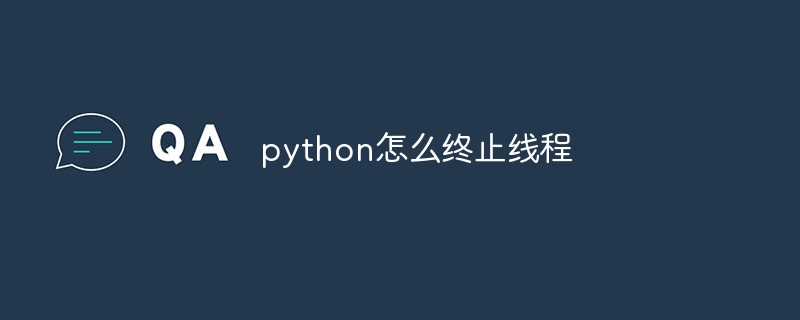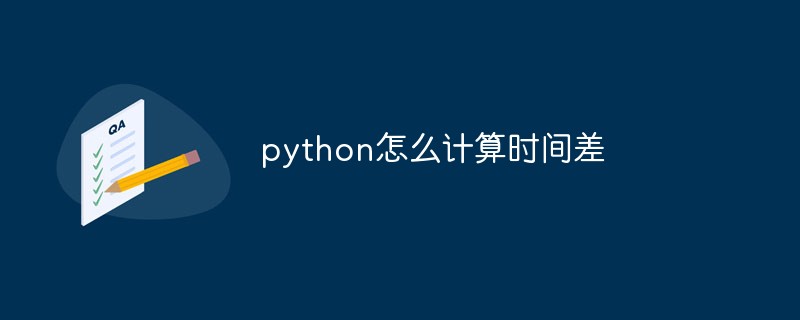資訊內容
python如何終止線程前言 · 零解決方案 · 壹解決方案 · 貳解決方案 · 叁
python終止線程的方法:1、調用stop函數,并使用join函數來等待線程合適地退出;2、在python線程里面raise一個Exception;3、用“thread.join”方式結束線程。r4P少兒編程網-https://www.pxcodes.com
 r4P少兒編程網-https://www.pxcodes.com
r4P少兒編程網-https://www.pxcodes.com
本文操作環境:windows7系統、python3.5版,DELL G3電腦。r4P少兒編程網-https://www.pxcodes.com
前言 · 零我們知道,在python里面要終止一個線程,常規的做法就是設置/檢查 --->標志或者鎖方式來實現的。r4P少兒編程網-https://www.pxcodes.com
這種方式好不好呢?r4P少兒編程網-https://www.pxcodes.com
應該是不大好的!因為在所有的程序語言里面,突然地終止一個線程,這無論如何都不是一個好的設計模式。r4P少兒編程網-https://www.pxcodes.com
同時r4P少兒編程網-https://www.pxcodes.com
有些情況下更甚,比如:r4P少兒編程網-https://www.pxcodes.com
線程打開一個必須合理關閉的臨界資源時,比如打開一個可讀可寫的文件;線程已經創建了好幾個其他的線程,這些線程也是需要被關閉的(這可存在子孫線程游離的風險啊!)。簡單來說,就是我們一大群的線程共線了公共資源,你要其中一個線程“離場”,假如這個線程剛好占用著資源,那么強制讓其離開的結局就是資源被鎖死了,大家都拿不到了!怎么樣是不是有點類似修仙類小說的情節!r4P少兒編程網-https://www.pxcodes.com
知道為啥threading僅有start而沒有end不?r4P少兒編程網-https://www.pxcodes.com
你看,線程一般用在網絡連接、釋放系統資源、dump流文件,這些都跟IO相關了,你突然關閉線程那這些
沒有合理地關閉怎么辦?是不是就是給自己造bug呢?啊?!r4P少兒編程網-https://www.pxcodes.com
因此這種事情中**重要的不是終止線程而是線程的清理啊。r4P少兒編程網-https://www.pxcodes.com
解決方案 · 壹一個比較nice的方式就是每個線程都帶一個退出請求標志,在線程里面間隔一定的時間來檢查一次,看是不是該自己離開了!r4P少兒編程網-https://www.pxcodes.com
import threading class StoppableThread(threading.Thread): """Thread class with a stop() method. The thread itself has to check regularly for the stopped() condition.""" def __init__(self): super(StoppableThread, self).__init__() self._stop_event = threading.Event() def stop(self): self._stop_event.set() def stopped(self): return self._stop_event.is_set()在這部分代碼所示,當你想要退出線程的時候你應當顯示調用stop()函數,并且使用join()函數來等待線程合適地退出。線程應當周期性地檢測停止標志。r4P少兒編程網-https://www.pxcodes.com
然而,還有一些使用場景中你真的需要kill掉一個線程:比如,當你封裝了一個外部庫,但是這個外部庫在長時間調用,因此你想中斷這個過程。r4P少兒編程網-https://www.pxcodes.com
【推薦:python視頻教程】r4P少兒編程網-https://www.pxcodes.com
解決方案 · 貳接下來的方案是允許在python線程里面raise一個Exception(當然是有一些限制的)。r4P少兒編程網-https://www.pxcodes.com
def _async_raise(tid, exctype): '''Raises an exception in the threads with id tid''' if not inspect.isclass(exctype): raise TypeError("Only types can be raised (not instances)") res = ctypes.pythonapi.PyThreadState_SetAsyncExc(tid, ctypes.py_object(exctype)) if res == 0: raise ValueError("invalid thread id") elif res != 1: # "if it returns a number greater than one, you're in trouble, # and you should call it again with exc=NULL to revert the effect" ctypes.pythonapi.PyThreadState_SetAsyncExc(tid, 0) raise SystemError("PyThreadState_SetAsyncExc failed") class ThreadWithExc(threading.Thread): '''A thread class that supports raising exception in the thread from another thread. ''' def _get_my_tid(self): """determines this (self's) thread id CAREFUL : this function is executed in the context of the caller thread, to get the identity of the thread represented by this instance. """ if not self.isAlive(): raise threading.ThreadError("the thread is not active") # do we have it cached? if hasattr(self, "_thread_id"): return self._thread_id # no, look for it in the _active dict for tid, tobj in threading._active.items(): if tobj is self: self._thread_id = tid return tid # TODO: in python 2.6, there's a simpler way to do : self.ident raise AssertionError("could not determine the thread's id") def raiseExc(self, exctype): """Raises the given exception type in the context of this thread. If the thread is busy in a system call (time.sleep(), socket.accept(), ...), the exception is simply ignored. If you are sure that your exception should terminate the thread, one way to ensure that it works is: t = ThreadWithExc( ... ) ... t.raiseExc( SomeException ) while t.isAlive(): time.sleep( 0.1 ) t.raiseExc( SomeException ) If the exception is to be caught by the thread, you need a way to check that your thread has caught it. CAREFUL : this function is executed in the context of the caller thread, to raise an excpetion in the context of the thread represented by this instance. """ _async_raise( self._get_my_tid(), exctype )正如注釋里面描述,這不是啥“靈丹妙藥”,因為,假如線程在python解釋器之外busy,這樣子的話終端異常就抓不到啦~r4P少兒編程網-https://www.pxcodes.com
這個代碼的合理使用方式是:讓線程抓住一個特定的異常然后執行清理操作。這樣的話你就能終端一個任務并能合適地進行清除。r4P少兒編程網-https://www.pxcodes.com
解決方案 · 叁假如我們要做個啥事情,類似于中斷的方式,那么我們就可以用thread.join方式。r4P少兒編程網-https://www.pxcodes.com
join的原理就是依次檢驗線程池中的線程是否結束,沒有結束就阻塞直到線程結束,如果結束則跳轉執行下一個線程的join函數。 先看看這個: 1. 阻塞主進程,專注于執行多線程中的程序。 2. 多線程多join的情況下,依次執行各線程的join方法,前頭一個結束了才能執行后面一個。 3. 無參數,則等待到該線程結束,才開始執行下一個線程的join。 4. 參數timeout為線程的阻塞時間,如 timeout=2 就是罩著這個線程2s 以后,就不管他了,繼續執行下面的代碼。# coding: utf-8 # 多線程join import threading, time def doWaiting1(): print 'start waiting1: ' + time.strftime('%H:%M:%S') + " " time.sleep(3) print 'stop waiting1: ' + time.strftime('%H:%M:%S') + " " def doWaiting2(): print 'start waiting2: ' + time.strftime('%H:%M:%S') + " " time.sleep(8) print 'stop waiting2: ', time.strftime('%H:%M:%S') + " " tsk = [] thread1 = threading.Thread(target = doWaiting1) thread1.start() tsk.append(thread1) thread2 = threading.Thread(target = doWaiting2) thread2.start() tsk.append(thread2) print 'start join: ' + time.strftime('%H:%M:%S') + " " for tt in tsk: tt.join() print 'end join: ' + time.strftime('%H:%M:%S') + " "默認join方式,也就是不帶參,阻塞模式,只有子線程運行完才運行其他的。r4P少兒編程網-https://www.pxcodes.com
1、 兩個線程在同一時間開啟,join 函數執行。r4P少兒編程網-https://www.pxcodes.com
2、waiting1 線程執行(等待)了3s 以后,結束。r4P少兒編程網-https://www.pxcodes.com
3、waiting2 線程執行(等待)了8s 以后,運行結束。r4P少兒編程網-https://www.pxcodes.com
4、join 函數(返回到了主進程)執行結束。r4P少兒編程網-https://www.pxcodes.com
這里是默認的join方式,是在線程已經開始跑了之后,然后再join的,注意這點,join之后主線程就必須等子線程結束才會返回主線。r4P少兒編程網-https://www.pxcodes.com
join的參數,也就是timeout參數,改為2,即join(2),那么結果就是如下了:r4P少兒編程網-https://www.pxcodes.com
兩個線程在同一時間開啟,join 函數執行。r4P少兒編程網-https://www.pxcodes.com
wating1 線程在執行(等待)了三秒以后,完成。r4P少兒編程網-https://www.pxcodes.com
join 退出(兩個2s,一共4s,36-32=4,無誤)。r4P少兒編程網-https://www.pxcodes.com
waiting2 線程由于沒有在 join 規定的等待時間內(4s)完成,所以自己在后面執行完成。r4P少兒編程網-https://www.pxcodes.com
join(2)就是:我給你子線程兩秒鐘,每個的2s鐘結束之后我就走,我不會有絲毫的顧慮!r4P少兒編程網-https://www.pxcodes.com
以上就是python如何終止線程的詳細內容,更多請關注少兒編程網其它相關文章!r4P少兒編程網-https://www.pxcodes.com

- 上一篇

講解Python 基于文件操作實現購物車
簡介免費學習推薦:python視頻教程Python基于文件操作實現購物車學習Python有一段時間了,想著需要找些東西寫一下來鞏固下基礎,看到了購物車然后想著能不能利用已經學過的實現以下功能。但是比較簡單的實現也沒啥意義,只用幾個循環和判斷寫出來也沒用到些啥于是想著能不能更進一步修改一下,做一個優化。剛
- 下一篇

python怎么計算時間差
簡介python計算時間差的方法:首先引入datetime包;然后通過“(time_2_struct-time_1_struct)”方式計算出同一天情形下的時間差或者不同天的時間差即可。本文操作環境:windows7系統、python2.7.14版,DELLG3電腦。python求時間差python求時

